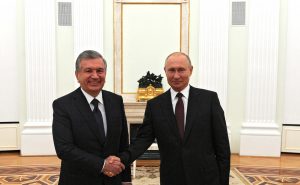On June 24, Uzbek President Shavkat Mirziyoyev attended the celebrations of the 75th anniversary of the end of World War II held in Moscow, postponed from its traditional May 9 date as a result of the COVID-19 pandemic. A day before that, Mirziyoyev and Russia President Vladimir Putin held a brief meeting in the Kremlin, exchanging the typical diplomatic niceties. Toward the end, the Uzbek president expressed his support for the referendum on constitutional amendments scheduled for June 25-July 1, wishing Putin success. The constitutional referendum has since been approved, with 78 percent of votes cast approving the changes.
According to the Kremlin transcript, Mirziyoyev’s statement went as follows: “I take this opportunity to wish you success. Of course, July 1 is a historic day for a new Russia — a change in the Constitution. I think that people today perceive correctly that everything that we see now, everything that is said there, should have been done for a long time, and today the time has come. I think these are the amendments that will serve the people of Russia. So I want this day in the history of new Russia to be very successful.”
Mirziyoyev did not specify which of the constitutional amendments he endorsed or whether he endorsed all of them. Indisputably the most significant amendment allows Putin to stay in power until 2036. Therefore, the remark could reveal Mirziyoyev’s favorable attitude to Putin’s past and future tenure and that he sees Putin as the best leader Russia could have. The statement could also serve as an endorsement for Putin’s past and future work in the domestic and foreign realms. Furthermore, the statement also refines Mirziyoyev’s position in relation to Putin, confirming that unlike his predecessor, Islam Kairmov, he sees Putin as a benign actor.
Putin’s ongoing tenure, potentially lasting for at least another 16 years, has serious implications for Tashkent and other Russian partners. The unambiguous support for constitutional changes could be interpreted by some as an invitation for Putin to continue his neoimperial activities in the Eurasian region. Given that this endorsement took place amid Moscow’s recent demonstrations of its revisionist attitude – in the most recent example, Putin accused the former Soviet Union states of “walking away with the lands gifted by Russia” (a clear allusion to Kazakhstan) — makes matters even more complicated in terms of Tashkent’s geopolitical direction.
Moscow regularly reminds the Central Asian countries about its dominant role in the region. Throughout the years under Putin, Russia has viewed Central Asian states as submissive to Moscow. The recent debacle between Uzbek and Russia officials over Tashkent’s efforts to increase punishments for failing to use the written Uzbek language in government business is a testament of direct interference. Back in 2018, Russian Foreign Minister Sergei Lavrov criticized Kazakhstan for introducing visa-free arrangements to the citizens of United States without consulting with officials in Russia, as a member of the Eurasian Economic Union (EAEU).
In another instance, Lavrov remarked in 2018 that the C5+1 format — bringing together the states of Central Asia and the United States — is an attempt to turn the region against Russia. Moscow sent a similar message in 2019 to the representative of the EU, calling on the EU to “respect” Russia’s activities while pursuing various diplomatic initiatives in the region.
Uzbekistan and the other countries in the Central Asian region have a history of responding meekly or staying silent when Moscow hurls neoimperial sentiments toward them. Moscow will ensure the region stays loyal; it has a demonstrated interest in and history of doing so. As Russia’s appetite to control the region has grown under Putin and his continued tenure in the coming decades has now been solidified, any overt submissions, like that voiced by the president of Uzbekistan on June 23, could serve as further invitation for interference.

































